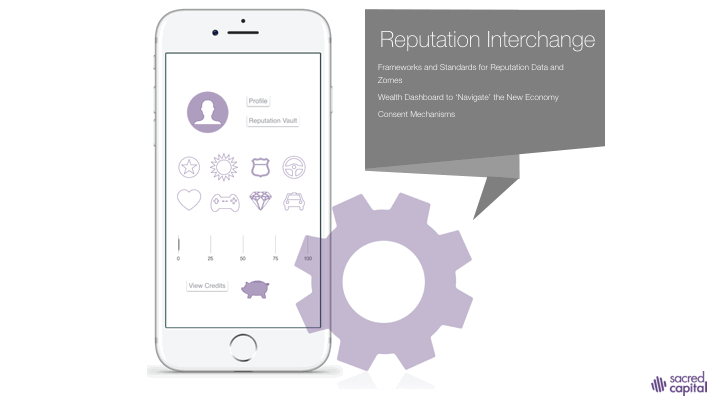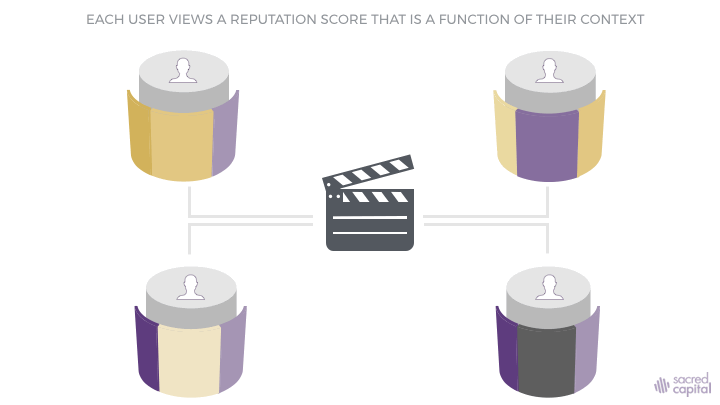Is there not a danger that reputational currencies will only create a different type of inequality - one based on reputation?
Also in the interview:
“A formal reputation economy will allow us to think of organisations as dynamic and evolutionary instead of static.”
How, exactly, will a reputation economy help us to think of organisations as dynamic and evolutionary instead of static?
I love what you guys are doing and was great chatting the other day! 
As I said on the call, my main concern is sometimes misunderstandings and mis-communications can occur and then its like that person will have a black mark against their name for all eternity? Then people would avoid working with them and they will be at a disadvantage, which could have a snowball kind of effect. We need a way of building in forgiveness and compassion into the system so everyone has a chance to earn a good reputation regardless of any mistakes or misunderstandings that have occurred in the past…
But at the same time I presume they would have the opportunity to redeem themselves? I feel there needs to be some kind of appeal process if people feel they have been given an unfair score/rating that is being used against them. We also need a way of verifying that the score is valid and accurate and not made up to promote themselves or business and to disadvantage their competitor, etc…
Saying that, I am a big fan of this and feel it is the future and is why we will be using this for the Karma system in the OASIS API system for Our World… 
Can you please expand on the relative reputation score (context) as well as staking? Thank you. 
What can Reputation Labs do for you?
If you’re an entrepreneur, you can leverage reputation systems to accelerate interactions within your app. P2P environments may not have the benefit of centralised algorithms to drive user engagement, but by enabling users to ‘import’ contexts from other apps, you can spark off new kinds of interactions.
Think of each application as a social setting. Traditionally a user entering the environment starts from a sanitised blank slate, forced to re-engage with strangers. But through the reputation economy they can import multiple layers of contexts. The user effectively engages with prior relationships as opposed to depending entirely on the centralised algorithm for the next article, interaction, swipe or conversation in the application.
For example, a user who has existing relationships in a sharing economy app, could leverage this to accelerate interactions in other applications like social media, micro-blogging or even other allied sharing economy apps.
Reputation Labs helps you understand basic principles of Reputation, design it for your application and empower your users to port it across systems for highly engaged experience!
A reputation can be built from objective, measurable data points (e.g. money transferred in time) or subjective information (the Uber car was too cold).
Have you thought of ways to control for such subjectivity?
In addition, different social, legal, and economic environments may result in differences in how reputation is constructed and construed.
Is it economically viable to participate in a reputation-based system? Can you provide successful examples?
Love the ideas shared by Sacred Capital and the deeper questions here? My interest was in know about the macroeconomic picture and how ready are as a whole to move to these new ways of thinking and engaging with each other (via reputation, user-owned data, so on). Whats our sense of the adoption enablers and timeline for early adopters and subsequent folks?
The role of reputation labs is to help entrepreneurs and app developers to think about reputation design. Generally, a well-designed reputation system would have some form of a legacy mechanic (Taking into account previous reputations).
This legacy mechanic would allow consistently high-rated users to reap some benefits, whilst giving lower-rated users a chance to build their reputation back up.
Because user’s have the ability to see how reputation is designed, well-designed reputation systems where forgiveness and fairness are prevalent, should garner more users than those with badly designed reputations.
Due to the agent centric nature of the reputation interchange, the user has the power to navigate through the new economy in their own terms. This gives the user agency on where they choose to stake their reputations, letting them decide whether a score is fair or valid.
If a user wants to participate in an ecosystem that calculates reputation in a way that they don’t necessarily agree with, they could choose not to stake any external reputation into said ecosystem. This, however, would eliminate a large amount of the network effects gained from participating in the interchange.
Essentially, our system is designed to give the user’s agency over their own reputational wealth.
Does being agent centric also mean that reputation scores are not objectively true, but clearly originating from specific agents doing the rating? e.g., if someone has a habit of giving unfair scores, then collectively we should be able to see that ratings from this person are less reliable than others.
Yes. Each application or ecosystem has the freedom to articulate or design their reputation to fit their specific needs.
Great questions. Will address the three parts separately.
-
Reputation staking is one of the principles of the Reputation economy - Since it’s non-zero sum, it can’t be spent, but can be staked.
In the agent centric environment, when you ‘stake reputation’ in implies you are willing to place at stake an activity in one app/eco-system to provide more context to another.
This is initiated by the app creators, who ‘propose’ a stake, and completed when you, the user ‘consents’. This consent essentially allows you to import context into this new application. This means you’re not engaging in the new application in a sterile manner, as a stranger - but with a rich social backdrop (check some of the other examples share above). If you believe past reputation isn’t relevant in this application, you can choose to not consent. -
In the first phase of our rollout our focus is on building a common foundation that can be shared by applications. We’re exploring conversations with the Holo team to release a set of standards and frameworks for data structures and Zomes that will be used by all apps for Reputation computations. Once this is in place, we’ll shift to Phase 2. This involves providing users a ‘dashboard to navigate the new economy’. Think of it as a control panel through which you can build and harness your reputation wealth to modulate your engagements in the new economy. The attached image should offer some insights.
-
Regarding the business model - we haven’t made it public yet - stay tuned - details will be announced in the coming months


This is a question that often comes up in our conversations  And one that we must be mindful of. Here are a couple points to consider though:
And one that we must be mindful of. Here are a couple points to consider though:
- Reputation thrives under diversity and contextuality, so building the stacked up structures that are common in the traditional economy are harder. For example a single, centralised top-down score for ‘who is the best film critic’ isn’t as effective as a fragmented mosaic of reputation scores. That’s because who I might consider a good film critic might differ from yours. Building reputation as an economy is the key here since it promotes this multi-dimensional approach.
- This might be worth an extended conversation - but I’ll put it out anyway. Since reputation is fundamentally non-zero-sum - there’s never a question of ‘inclusion’ as you do with money. Anyone can leverage the reputation economy as long as there is rich social fabric i.e. a community of people willing to validate your work.
We think these two point go a long way in building a meritocracy of sorts, and reducing some of the inequities that exist in the current economy system.
Does being agent centric also mean that reputation scores are not objectively true, but clearly originating from specific agents doing the rating? e.g., if someone has a habit of giving unfair scores, then collectively we should be able to see that ratings from this person are less reliable than others.
Reputations can be either objective or subjective, and can be relative or absolute.
Absolute objective reputations are relatively easy to do (exam grades, traffic violations, no. of likes on a post) but they are not very rich. They are unable to capture more subtle judgements, and how it matters to you.
So unfair scores definitely are a a good use case for the power of relative and subjective ratings. If everyone who you value rates a certain individual’s subjective ratings poorly then that should show up to you when you interact with that person.
(Combining this with the question by @dellams above: Can you please expand on the relative reputation score (context) as well as staking? Thank you.  ) @Brooks
) @Brooks
@jakob.winter, yes you’re right - reputation data is of two types: objective data as well as subjective view points. While objective data is easier to handle, subjective data is best represented through ‘Relative Reputation’.
This is captured in point no. 3 of the Reputation Economy principles Relative Reputation basically means the reputation score is a function of ‘who is querying’. In other words, the score that you see about your ride share driver is a function of your context (maybe your network, or preferences in the past etc.) and not an absolute score that everyone sees in the same way.
This sounds complex, but is actually highly intuitive in agent centric environments like Holochain - since we aren’t trying to establish universal consensus. Reputation scores get calculated on individual user chains, which hold information that is relevant to us, and not the entire community.
So to answer your question in a sentence, the key lies in embracing relativity, and staying away from absolute, monolithic definitions of reputation.

AMA question: In your interview The Yin and Yang of Wealth you say:
“We now know that the problems of climate change, lack of emotional well-being, and inequity can’t be solved with material capital alone. They require organised efforts to facilitate cultural shifts, re-building social fabric, information sharing and more.”
How do you see reputational currencies contributing to the resolution of such problems?
At an abstract level, we are creating a formal economic language for reputation. This enables reputation to serve as an economic vehicle for social, cultural and informational capital. It’s a sharp contrast to money serving as the only vehicle available for all forms of capital.
In more tangible terms, it allows entrepreneurs or people driving movements to reward specific behaviour in tangible, yet non monetary ways.
So in terms of contributing to solving the big problems of our time, we see reputational currencies as a way to introduce more meritocracy into wider discussions and social exchanges. Valuing agent centric reputations should drive a different set of outcomes from the ones we are getting today.
What are your personal stories? What inspired you to become interested in these current-sees and reputation?
What is your personal motivation to build this ecosystem? Is there a vision you would like to see in your personal live and/or in the world because of what you are building?
Hi @raphisee I’ll share from the Sacred Capital Intro page on the Forum.
What motivated you to create your app/platform?
After a life as a mainstream trader, I spent four years at a community founded by Gandhi where I came across living examples of distributed economics. A conversation with Eric Harris-Braun in 2014 sparked Sacred Capital. We’ve been formally developing the project since 2017. The intention is to build a formal economic language for multi-dimensional value, not only material value.

